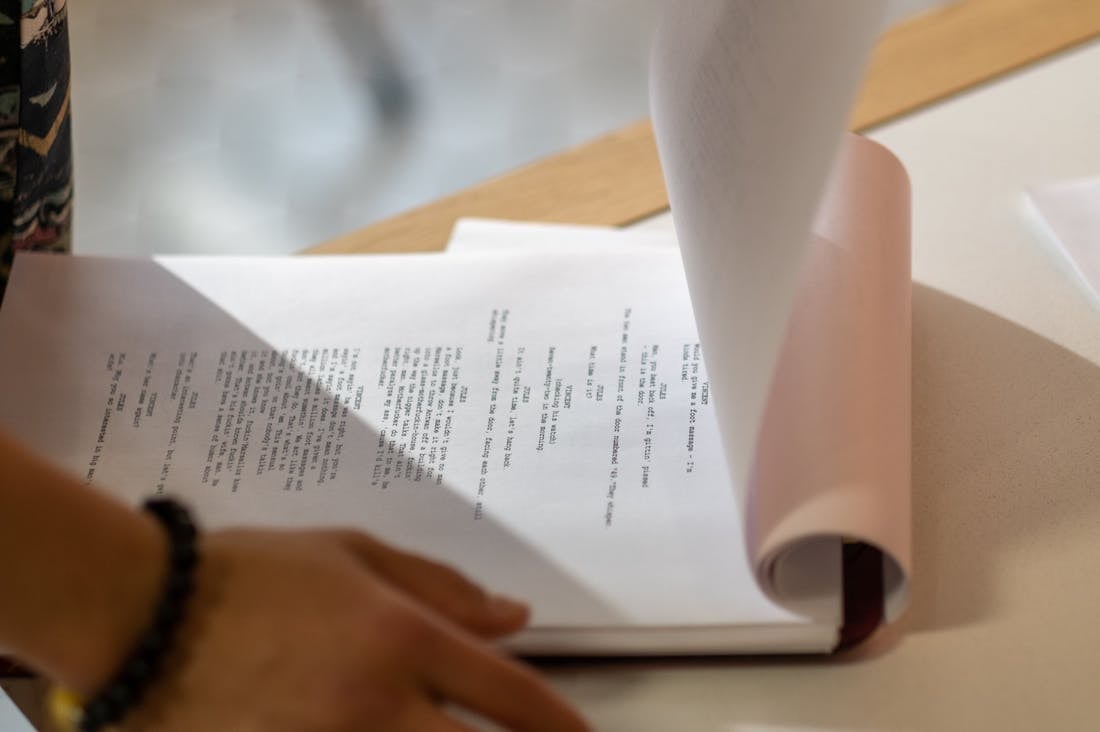Demystifying Copyright: What Every Screenwriter Needs to Know
November 20, 2023
You’ve finished your screenplay and you want to start submitting it to industry professionals, but should you get it copyrighted beforehand to keep someone from stealing what you’ve written?
Unknown to many writers, your screenplay is automatically copyrighted as soon as you’ve written it (like any creative work once it’s fixed into a tangible form). So if you can prove you’ve written your screenplay, you’re simultaneously proving you own the copyright.
In that case, why do many writers register their scripts for copyright?
If it’s automatically copyrighted, why bother?
To answer this question and to help me demystify copyright law, I talked with copyright law experts David Newhoff and Steven Tepp, who have cofounded RightsClick, which is an online service that provides copyright registration for writers (think of it as TurboTax but for copyright registration). Newhoff has a background in film production and communications and has been a copyright advocate for over a decade. Tepp has an extensive background in IP law and in addition to serving as senior counsel for the U.S. Copyright Office and teaching copyright law at George Washington Law School, he’s been a copyright advocate for over twenty years.

Why You Should Bother Registering Your Copyright
“Under U.S. copyright law if you have not registered your copyright with the U.S. Copyright Office,” Tepp said. “you have sacrificed almost all of the most important enforcement elements of the law.
“First and foremost, you cannot file an infringement suit in federal court if you have not registered your work. They’re going to throw you right out of court if you try to do that.
“A lot of creators will say, ‘Well, you know, I’m never going to file a lawsuit in federal court. Why does this even matter?’ And the answer is: if you find an infringement and don’t want to go to court, but you send a cease and desist letter and say, ‘You owe me some money’, you’ve now entered into a negotiation. You’re essentially playing poker with the other side. Neither of you wants to go to court. You want to get the most money you can and they want to spend the least amount of money they have to spend to make this go away.
“If you present an organized case — I’ve registered my work, I know my rights — that’s a more effective way to begin a negotiation than sending them a letter and they look up the work on the U.S. Copyright Office website and they see you haven’t registered: they’ll think ‘They can’t really sue us. We can call their bluff.’ So it’s critical in negotiations even if you’re never going to court.”
Timing Is Everything When It Comes To Copyright Law
“The timeliness of the registration matters because if the infringement you’re trying to deal with started before you registered,” Tepp explained, “you lose what is known as statutory damages, which is just a range of dollars in the law. If you prove the infringement and now you’re in the damages phase and you’re entitled to statutory damages, you don’t have to prove what the infringement cost you. You just say to the court, ‘Pick a number.’ And it’s up to 30,000 dollars per work infringed in an ordinary infringement.

“If you prove the infringement was willful, it’s up to 150,000 dollars per infringed work and you don’t have to prove anything. And if you’ve registered in a timely fashion, you can also request that the infringer pay your attorney fees. Statutory damages is automatic if you have registered in a timely manner; it’s just up to the court, the judge, or the jury to decide what number in the range. “
But what constitutes a “timely fashion” when registering your work? What’s a desirable time frame?
“It’s a question of,” Tepp said, “did you register before the infringement that you’re trying to address began?”
Register Your Copyright Before Circulating Your Spec Script
So the ideal time to register your copyright would be between the completion of your screenplay and circulating it to industry professionals. But does this just cover a spec script?
“This should generally apply to spec work because,” Newhoff answered, “if you’re hired to write a screenplay by a producer, the producer is the rights holder of that screenplay. This is really for the individual artist, but even for the independent producer who might be hiring a screenwriter.
“The best thing to do is just register before it goes anywhere. Register before you send it to your agent. Register it before you send it to anybody. That’s the best thing to do because then you’re safe; it would definitely predate any possible infringement because no one else has seen it yet.”

Registering with the WGA vs the U.S. Copyright Office
What distinguishes registering with the Writer’s Guild of America and registering with the U.S. Copyright Office? Are writers protected if they register their script with the WGA and not the U.S. Copyright Office?
“WGA registration opens you up to WGA arbitration but it has no bearing in a court of law,” Newhoff said. “A lot of writers assume that ‘I’m registered with the Guild, so I’m covered.’ And they are to a point within the industry. The Guild is an intramural forum for remedying a potential dispute and it’s there for that reason: so we can remedy our disputes without suing one another within the industry.
“But if it gets to the point that somebody needs to be sued and you’re not registered with the Copyright Office, if you call up your attorney and say, ‘I think we need to move forward with litigation.’ The first thing your attorney will ask is, ‘Is it registered?’ And if it’s not, the next thing they’re likely to say is, ‘I probably can’t do much for you.’
“Most production entities that you’d potentially look to litigate against are going to know what they’re doing because they’re going to have attorneys who know what they’re doing. So that’s really the key. If you’re not registered, you probably won’t even start the conversation.”
Can You Copyright an Idea?
What if you meet with a production company or studio exec and pitch an idea to them and a few years later they made a film with a similar idea without your involvement? Can you file a lawsuit against them? Can you copyright an idea as you would a finished artistic work?

“Copyright does not protect ideas,” Tepp answered. “It protects the specific expression of particular ideas. So if you had a meeting and said, ‘I’ve got an idea about a guy who is lost in the jungle.’ And two years later they come out with Indiana Jones, you’re not going to get anywhere with a court saying, ‘But I had the idea about a guy lost in the jungle!’ That’s too abstract.
“You would need to show that you had a screenplay — and that you registered it —and it had the particulars of a character with his brown hat and his whip and he was a university professor who part-time went on these wild adventures. The more specific you have it in the expression, then the stronger case you have that they copied protectable subject matter. Whether you can actually enforce that is a question of whether it’s registered.”
Copyright Law and the Burden of Proof
Do you need to prove the copyright infringers read your script?
“There are two pieces to proving copyright infringement,” Tepp answered. “The first is access: did the other person have access to the work you’re claiming they copied? Because if you wrote something and it was locked in your drawer, then there’s no way they could have copied it. But if you had a meeting with them where you discussed the particulars, then they had access. And then the second piece is substantial similarity: how similar is what they came out with to what you created first.”
And of course, if you sent your script to a producer via email, save that email because, as Tepp confirmed, “that proves access” if you believe there’s a copyright infringement.

No Workarounds To Copyright Registration
What about mailing your script to yourself? Does that give writers any kind of legal protection?
“Mailing a copy to yourself is an utterly meaningless practice,” Newhoff said. “Save the stamp.”
“Only registration with the Copyright Office allows you to go to federal court,” Tepp expanded. “Only registration with the Copyright Office gives you access to statutory damages and attorney fees. And if you have that registration that is an initial proof that you created the work and it’s copyrightable. Unless the defendant can produce evidence that you didn’t create it, the court will recognize it as your screenplay, look at what the defendant copied, and will go straight to the infringement analysis.
“You’re not going to know in advance whether you’re going to have a strong claim or a weak claim. But if you register first and it turns out you have a good claim, now you’re ready to go. If you haven’t registered, even with a good claim, you’re behind the 8 ball.”
Written by: Edwin Cannistraci
Edwin Cannistraci is a professional screenwriter. His comedy specs PIERRE PIERRE and O’GUNN both sold with more than one A-list actor and director attached. In addition, he’s successfully pitched feature scripts, TV pilots and has landed various assignment jobs for Universal, Warner Bros, Paramount and Disney.



